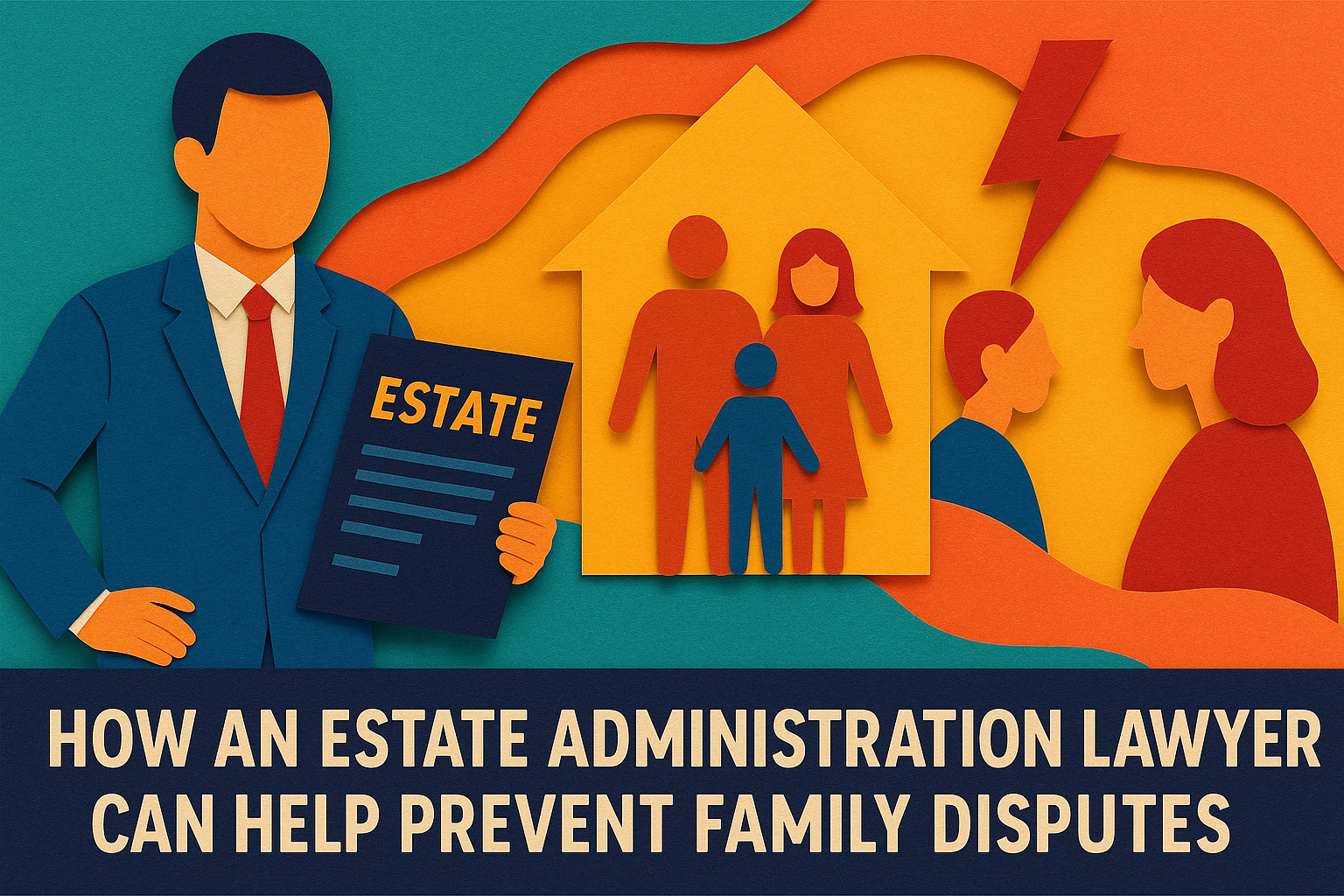
How an Estate Administration Lawyer Can Help Prevent Family Disputes
When a loved one passes away, grief and responsibility arrive together. Executors face the legal task of settling the estate, while heirs wait for clarity on inheritance. In many families, this process creates suspicion, tension, and conflict. Old rivalries resurface. Perceived unfairness breeds anger. Left unchecked, these tensions can explode into lawsuits that damage both wealth and relationships.
The question many families ask is whether conflict is inevitable. The answer is no. With legal guidance, families can reduce the risks that lead to disputes. An estate administration lawyer provides the structure, transparency, and authority that protect families from infighting. By understanding how lawyers help prevent estate disputes, families gain tools to preserve both legacies and relationships.
Why Family Disputes Arise in Estate Administration
Estate administration brings out stress, grief, and uncertainty. Even families who appear close may find themselves at odds. Disputes often arise when:
- Heirs distrust the executor. They believe decisions are hidden or unfair.
- Assets are unclear or unequal. Some heirs receive property worth more than others.
- Debts reduce inheritance. Unexpected creditor claims frustrate expectations.
- Documents contain ambiguities. Wills or trusts leave room for interpretation.
- Old rivalries resurface. Grief magnifies long-standing family tensions.
Without legal structure, these disputes can escalate into lawsuits that drain the estate and leave permanent scars.
The Lawyer’s Role in Preventing Conflict
An estate administration lawyer does more than file paperwork. They create an environment where transparency and fairness reduce suspicion. They guide executors, reassure beneficiaries, and ensure legal compliance. Their role in helping to prevent estate disputes includes:
- Clarifying responsibilities. Explaining the executor’s duties so heirs understand the process.
- Providing transparency. Sharing valuations, accountings, and timelines to build trust.
- Ensuring compliance. Meeting legal deadlines and requirements that, if ignored, fuel conflict.
- Mediating early. Addressing disputes before they escalate into litigation.
By providing both authority and communication, lawyers lower the temperature in emotionally charged situations.
How Transparency Builds Trust
Lack of information breeds suspicion. Beneficiaries who feel excluded may believe the executor is hiding information or acting unfairly. Transparency is one of the most powerful tools to prevent estate disputes.
Lawyers help by:
- Providing regular updates to heirs.
- Sharing accountings of assets and debts.
- Using neutral appraisers to value property.
- Documenting decisions with legal support.
When beneficiaries understand what is happening and why, they are less likely to challenge decisions.
Ensuring Fair Asset Valuation
Disputes often arise when heirs believe assets are undervalued or distributed unequally. For example, one sibling may inherit a family home, while another receives cash. Without accurate appraisals, resentment builds.
Lawyers coordinate professional valuations. Neutral appraisers establish fair market value. With clear numbers, heirs understand the fairness of distributions, reducing conflict. This is one of the most practical ways lawyers help prevent estate disputes.
Handling Debts Before Distributions
Beneficiaries sometimes push for quick distributions. But debts and creditor claims must be resolved first. Executors who distribute assets too soon may face personal liability.
Lawyers manage this by:
- Notifying creditors properly.
- Validating legitimate claims.
- Rejecting or disputing invalid claims.
- Ensuring debts are paid in the correct order.
This prevents disputes by ensuring fairness and legality before assets change hands.
Clarifying Ambiguous Documents
Not all wills are clear. Some contain vague language. Others conflict with codicils or handwritten notes. Ambiguity leads to interpretation battles.
Lawyers interpret documents using probate law. They explain what the court requires and guide executors through unclear instructions. By clarifying early, they reduce disputes later.
Mediating Before Litigation
Not every conflict can be avoided, but many can be resolved without court. Lawyers serve as mediators, helping families find compromise. They:
- Facilitate conversations in neutral settings.
- Explain legal requirements to reduce unrealistic expectations.
- Propose solutions that balance fairness with compliance.
This proactive approach often resolves disagreements long before they escalate into costly litigation.
Suggested Reading:
For a deeper look at how conflicts escalate and how lawyers step in to manage them, see Hackard Law’s article Community Property vs. Separate Property Disputes in California Trusts: What Families Need to Know. It highlights how disputes arise from property characterization and how legal guidance prevents lasting harm.
Case Study: Two Families, Two Paths
Family A had a modest estate. The executor distributed property without legal guidance. Heirs believed the family home was undervalued. Arguments grew into lawsuits. Legal fees consumed much of the estate. Relationships fractured.
Family B faced similar assets. Their executor hired a lawyer early. The lawyer arranged appraisals, shared valuations, and explained each step. Transparency reassured heirs. Disputes never escalated. The estate closed efficiently, and family harmony remained.
The difference was not wealth but the decision to seek legal guidance to prevent estate disputes.
FAQs: Preventing Estate Disputes
- Do disputes happen in every estate?
No. But even close families can face conflict without clear guidance. - How much does a lawyer help?
By providing structure, compliance, and mediation, lawyers significantly reduce disputes. - Can transparency really prevent conflict?
Yes. Heirs who feel informed and respected are far less likely to contest. - What if beneficiaries still disagree?
Lawyers guide mediation before disputes become lawsuits. - Who pays for the lawyer?
Fees usually come from the estate, not from executors personally.
Checklist: Signs of Potential Disputes
- Beneficiaries distrust the executor.
- Assets are complex or difficult to value.
- Debts threaten inheritance.
- Wills contain vague instructions.
- Sibling rivalries already exist.
- Beneficiaries push for early distributions.
If any apply, consulting a lawyer early helps prevent estate disputes before they start.
Why Hackard Law?
Hackard Law has decades of experience guiding families through probate and estate administration. We provide:
- Transparency to build trust among heirs.
- Neutral valuations to ensure fairness.
- Compliance with deadlines and legal duties.
- Mediation to resolve disputes early.
- Protection for executors against liability.
Our goal is to help families not only preserve wealth but also preserve relationships.
Final Thoughts
Family disputes during estate administration are painful, costly, and often avoidable. Conflict arises from lack of information, unfair valuations, unresolved debts, or unclear documents. Lawyers provide the transparency, compliance, and mediation that prevent disputes before they escalate.
By working with counsel early, families protect not only assets but also relationships. The decision to prevent estate disputes through legal guidance honors both the decedent’s wishes and the family’s future.
Contact Us
If your family faces estate administration and you want to prevent conflict, Hackard Law is here to help. Contact us today to protect your assets, preserve harmony, and secure peace of mind.

 (916) 775-8542
(916) 775-8542 